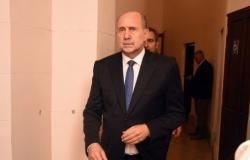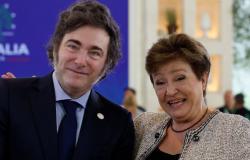
President Gustavo Petro and former president Iván Duque.
Photo: Private Archive
The lack of communicating vessels between those who have wanted to promote the idea of forming a common front that allows them to confront the progressivism of President Gustavo Petro in the 2026 elections, resulted in the head of state himself and his followers feeling with sufficient momentum not only to challenge their opponents but also to once predict that they have everything in place for the left to maintain power in the next elections.
In fact, Petro warned that his critics “are scared” with the changes that he considers are being positive for the country and for this reason he has the strength to ensure that the political project he embodies is sustained for at least another four years in the leadership of the Narino Palace.
And although the idea of forming an anti-Petrism bloc is not new, the fact that it was former President Iván Duque who took it up again in the last 48 hours gave it a different tone, as it opens the way for a right-wing sector that comes from the matrix of the Democratic Center, but does not feel so identified with the ways that are used today to control that party.
In fact, the differences in the Uribista group are increasingly public. On May 30, in his letter of resignation from the party, the former senator and former president of Congress, Ernesto Macías, acknowledged that there are fractures due to “the management in the National Directorate”, which in recent years was headed by Nubia Stella Martínez and since last February 6 in the hands of former representative Gabriel Vallejo. In that same letter he said that through a letter addressed to former President Uribe, he informed him of his decision to disassociate himself from any responsibility for the “internal division caused.”
More information: Congress and Government joined together to unblock part of an agenda immersed in controversies
And sources from that same community confirmed to this newspaper that Duque’s relationship with the majority of the party that supported him to reach the Casa de Nariño in 218 is not entirely good, and that his direct dialogue with former president Álvaro Uribe – natural leader of those awnings – is not the most fluid either.
“I believe that what is required today is for all those who want to be president in 2026 to come to the fore once and for all and to begin to agree on the possibility of Colombia having a great national republican alliance where, through a consultation mechanism, the unification of who can represent a true alternative can occur,” was the proposal that Duque launched at the annual meeting of Asobancaria, in Cartagena.
“They’re scared. If everyone unites against me, it is because we are doing something good. And I say yes, why not? We will resist. Not necessarily on Petro’s flag and photo, but on someone, a man or a woman, who can say with confidence that he will continue and deepen without the mistakes we have made as rookies, more wisely, more deeply and quickly, the reforms of the change in Colombia. And we are going to win again in 2026,” Petro responded at a public event in Aguachica, Cesar.
You may be interested in: This is how the sensitive data for which Petro charged again against Thomas Greg is handled
But Petro’s challenging response to Duque’s proposal in an electoral tone also has the culmination that the cohesion that an idea like that of the former president needs is still very raw, despite the fact that voices like that of former president César Gavia or that of former vice president Germán Vargas Lleras have outlined it in very similar terms in recent months.
This newspaper established that the interparty dialogues have not gone beyond the normal approaches that occur in Congress when they want to look for bridges to promote common actions, such as the strategy of leaving the plenary sessions to try to disrupt the quorum of the sessions when they are on the agenda. the reforms promoted by the Government.
It is what representative Juan Espinal, of the Democratic Center, called a “legislative strike” and that, despite the voices that the opposition wanted to support, was not fruitful. Only this week the third debate on the education reform and the last of the 14th session for those retired from the Public Forces were held.
It is of your interest: This is how the agenda that the opposition promotes moves in the remaining days of Congress
“Regardless of the criticism, it seems to me to be an act of profound political maturity by all forces. In this country there are elements that can lead us to find each other,” said the Minister of the Interior, Luis Fernando Velasco.
However, beyond the legislative mechanics to which each Government has to submit according to the support it has in the Capitol, the opposition organizations have not achieved specific scenarios of agreements.
A couple of months ago there was a meeting between former presidents Duque and Gaviria, who agreed to warn about what they considered to be the negative impact of the reforms promoted by the Casa de Nariño. But beyond the photo and the headlines of the moment, nothing concrete was created.
Indeed, the Liberal Party led by Gaviria for now has no intention of making alliances with the Democratic Center from which Duque comes, and the latter group has never included among its electoral plans to join forces with the former to promote a national candidate.
But this doesn’t just happen in these awnings. Cambio Radical, the Vargas Lleras community, has legislative alliances with other opposition parties, but beyond coalitions in regional elections they have not taken a significant step to try to seek broad candidacies for 2026.
And since the opposition deck is not only theirs, we must also look towards the Conservative Party. Its current president, Senator Efraín Cepeda, has also outlined the possibility of a great center-right alliance to confront progressivism in the following presidential elections, but that has not gone beyond an idea.
This whole proposal for an alliance, which Duque brought up again – and which has had antecedents in Gaviria, Uribe, Vargas and Andrés Pastrana, among others – is still raw, so nothing is seen in the short term. that surpasses the Congress stage for now.
(Duque calls for a broad citizen force to protect the Constitution)
However, similar things happen in the ranks of progressivism, since the more than 13 forces that united around the Historical Pact have not found ways to become a single party that allows them to maintain power in 26, as is the desire. of Petro and that uses the constituent narrative to promote that purpose.
For now, the two protagonist spectrums of politics are unable to unite their ranks on a common path – each one on its own shore – to strengthen alliances that give them electoral space to play strongly in the next elections.





